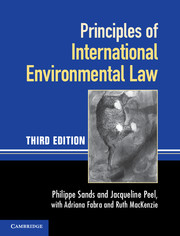Book contents
- Frontmatter
- Contents
- Foreword
- Preface and acknowledgments to the first edition
- Preface and acknowledgments to the second edition
- Preface and acknowledgments to the third edition
- Table of cases
- Table of treaties and other international instruments
- Abbreviations
- Part I The legal and institutional framework
- 1 The environment and international society: issues, concepts and definitions
- 2 History
- 3 Governance: states, international organisations and non-state actors
- 4 International law-making and regulation
- 5 Compliance: implementation, enforcement, dispute settlement
- Part II Principles and rules establishing standards
- Part III Techniques for implementing international principles and rules
- Part IV Linkage of international environmental law and other areas of international law
- Index
- References
1 - The environment and international society: issues, concepts and definitions
from Part I - The legal and institutional framework
Published online by Cambridge University Press: 05 June 2012
- Frontmatter
- Contents
- Foreword
- Preface and acknowledgments to the first edition
- Preface and acknowledgments to the second edition
- Preface and acknowledgments to the third edition
- Table of cases
- Table of treaties and other international instruments
- Abbreviations
- Part I The legal and institutional framework
- 1 The environment and international society: issues, concepts and definitions
- 2 History
- 3 Governance: states, international organisations and non-state actors
- 4 International law-making and regulation
- 5 Compliance: implementation, enforcement, dispute settlement
- Part II Principles and rules establishing standards
- Part III Techniques for implementing international principles and rules
- Part IV Linkage of international environmental law and other areas of international law
- Index
- References
Summary
Given that the land – and the sea – and the air-spaces of planet Earth are shared, and are not naturally distributed among the states of the world, and given that world transforming activities, especially economic activities, can have effects directly or cumulatively, on large parts of the world environment, how can international law reconcile the inherent and fundamental interdependence of the world environment? How could legal control of activities adversely affecting the world environment be instituted, given that such activities may be fundamental to the economies of particular states?
THE ENVIRONMENTAL CHALLENGE
It is widely recognised that the planet faces serious environmental challenges that can only be addressed through international co-operation. Acid rain, ozone depletion, climate change, loss of biodiversity, toxic and hazardous products and wastes, pollution of rivers and depletion of freshwater resources are amongst the issues that international law is being called upon to address, and since the mid-1980s the subject of international environmental law has emerged as a discrete field of public international law, although one that is closely related to many other areas. The conditions contributing to the emergence of international environmental law are easily identified: environmental issues are accompanied by a recognition that ecological interdependence does not respect national boundaries and that issues previously considered to be matters of domestic concern have international implications – at the bilateral, sub-regional, regional or global levels – that can frequently only be addressed by international law and regulation.
- Type
- Chapter
- Information
- Principles of International Environmental Law , pp. 3 - 21Publisher: Cambridge University PressPrint publication year: 2012
References
- 1
- Cited by



